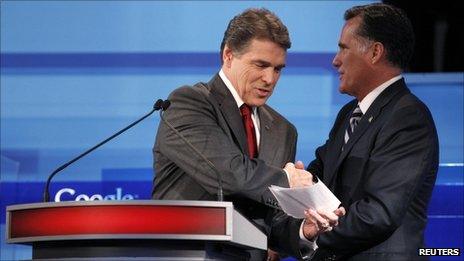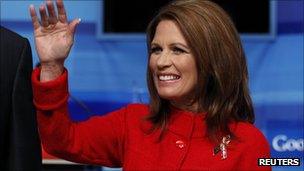Mitt Romney 'beat' Rick Perry in Republican debate
- Published

A voters' panel declared Mitt Romney (right) the victor over Rick Perry (left)
Mitt Romney is widely judged to have beaten frontrunner Rick Perry in the latest Republican television debate.
Nine White House hopefuls took to the stage in Orlando, Florida, but the two frontrunners hogged the limelight.
Texas Governor Perry and Mr Romney accused each other of flip-flopping on Social Security and healthcare, while Mr Perry was booed on immigration.
A focus group of voters assembled by host Fox News Channel declared former Massachusetts governor Romney had won.
Most media commentators agreed that it had not been Mr Perry's night.
Also appearing in Thursday's two-hour debate, sponsored by Google, were Congresswoman Michele Bachmann, Georgia businessman Herman Cain and former Utah Governor Jon Huntsman.
Book criticism
Former House Speaker Newt Gingrich, former Senator Rick Santorum, Congressman Ron Paul and former New Mexico Governor Gary Johnson joined the fray.
Mrs Bachmann, an early frontrunner who has struggled to hold on to her lead since Mr Perry entered the race in August, was once again overshadowed in the debate.
But in an appearance on CBS News' The Early Show on Friday, she dismissed any suggestion that she might throw in the towel.
"We're in it for the marathon," she insisted.
The federal pension programme proved an early flashpoint, with Mr Romney taking aim at Mr Perry, who labelled the system a "Ponzi scheme" in an earlier debate.
Bearing in mind Florida's vast elderly population, Mr Perry said he advocated reform of Social Security, while adding that it should be safeguarded for existing beneficiaries.
But Mr Romney pointed to Mr Perry's past criticisms of Social Security.
"There's a Rick Perry out there that's saying that... the federal government shouldn't be in the pension business, that it's unconstitutional and to be returned to the states," said Mr Romney. "So you better find that Rick Perry and get him to stop saying that."
Mr Perry said his stance on the issue had shifted "not one inch, sir", then hit back saying that Mr Romney had changed his position on healthcare between editions of a book he had published.
In one edition, Mr Perry said, Mr Romney had advocated expanding the healthcare programme he signed in Massachusetts to the rest of the country.
"Then in your paperback you took that line out, so speaking of not getting it straight in your book, sir," said Mr Perry.
"I think Americans just don't know sometimes which Mitt Romney they're dealing with," Mr Perry added.
Stolen joke?
Some spectators later jeered as Mr Perry defended the Texas system of giving in-state tuition to the children of illegal immigrants.

Michele Bachmann attacked Mr Perry again on immigration
Mr Santorum accused Mr Perry of being "soft" on immigration, while Mr Romney said Texas' policy was equivalent to giving a $100,000 (£65,000) credit to those children.
Mrs Bachmann said Mr Perry's policy was "a magnet", adding: "End the magnets for illegal aliens to come into the United States of America."
But Mr Perry said: "If you don't think we should educate children who have been brought into our state by no fault of their own... I don't think you have a heart."
Lesser-known candidate Gary Johnson was widely judged to have produced the best line of the night.
"My next-door neighbour's two dogs have created more shovel-ready jobs than this administration," the former New Mexico governor said during his first debate appearance, provoking gales of laughter from his rivals and audience members alike.
It later emerged that conservative radio host Rush Limbaugh made the same joke in his show earlier on Thursday, something Mr Johnson acknowledged in his Twitter feed, external after the debate.
The debate was the third in as many weeks for the Republican hopefuls.
A poll released beforehand found Mr Perry with a 28-22% lead over Mr Romney among Florida Republicans.
But the survey by Quinnipiac University Polling Institute, external showed Mr Romney topped Barack Obama 47-40% in a possible 2012 contest, with Mr Obama beating Mr Perry 44-42%.
The contenders are vying for the Republican nomination to face Mr Obama in November 2012's elections.
The field is expected to narrow in the coming months as the Republican race heats up ahead of primary season early next year.
- Published21 September 2011